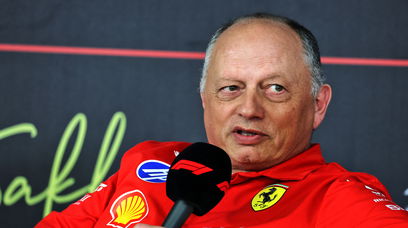Whether (or not) FIA President Mohammed Ben Sulayem’s tweeted comments about the reported $20bn value of Formula 1’s commercial rights contravene securities laws or breach Formula 1’s 100-year rights agreement between the FIA (owner) and Liberty Media (incumbent lessee) is ultimately for lawyers and judges to decide – if, that is, the matter even gets that far. Equally, whether the Emerati’s triple-thread tweet was clumsy, ill-advised or a pre-planned snipe at the US-owned company is unclear; what is, though, absolutely certain is that his phrases elicited a furious response from the Liberty-owned F1 rights holder, whose lawyers within 24 hours addressed a robust letter (seen by RacingNews365) warning that the comments “interfere in our rights in an unacceptable manner.” Despite not being specifically addressed to FIA World Motorsport Council members and the ten teams, these are said to have been included in the distribution list. One wonders, then, why members of the WMSC - of which F1 CEO Stefano Domenicali is a member - were included given the WMSC’s brief is to ratify “rules, regulations, safety and development of motor sport at every level from karting to F1.” By contrast, the FIA Senate is “the FIA’s top-ranked [and] oversees the management and finances of the Federation.” As such, the President of the Senate Carlos Sanz de Barros and not a group of motorsport administrators and F1 teams - who have no part in the dispute - should surely have been the primary point of contact. Whatever, details of the letter soon found their way into the public domain… That is the very point: There is a discernible and deliberate ratcheting up of the hostility between the two entities, from both sides. What started as a dispute over three or six Sprint races through who had the right to release the F1 calendar to the new teams process to the notional value of F1’s commercial rights has deteriorated into an all-out war fought in public, whether on social media platforms or leaked letters neither side has been shy in courting headlines. Significantly, both parties have made conflicting claims: the FIA believes it alone may decide on acceptance on new teams subject to applicants meeting FIA criteria while F1 believes it be a joint decision; F1 states that the FIA has limited input into a rights ownership change, whereas MBS claims the FIA “plays an advisory role.” Now-deceased ex-FIA President Max Mosley indicated a “Don King” veto exists in the contract. Thus, fans may never know the truth about a covenant that saw F1’s rights awarded by a Mosley-led FIA to the family trust of his long-standing friend Bernie Ecclestone for a total of 113 years. If that’s an eye-opener, consider the price: $313m for a sports property that five years later changed hands for $1,6bn before being sold in 2017 to Liberty for an enterprise valuation of $8bn. Five years later folk speak of a Saudi offer of $20bn!
Could a breakaway series be on the cards?
Consider that figure: Given an average team valuation of $500m, a quarter of the alleged $20bn offer price enables the Saudis to acquire the entire F1 grid for a quarter that (if need be), then fund a wholly owned (not leased) breakaway series for ten years while it establishes a championship - and pays them more handsomely from global TV and race promoter revenues. Already the region hosts four grands prix. Why buy a series under such circumstances when you can fund your own? The same commercial premise has seen the Saudis found the nascent LIV golf series, which they are promoting in opposition to official PGA tournaments but paying top dollar. Add in that Saudi is a major oil and alternate energy producer, making powerful, loud hybrid power units a perfect fit with the kingdom’s petroleum export activities.
The overriding question is, though, whether the FIA would sanction such a series; the bottom line is regardless of the prevailing hostilities the governing body has no choice but to approve such a breakaway series provided it complies with the FIA International Sporting Code’s safety and regulatory requirements - which may not be withheld provided the series is not called F1 or similar. The 100-Year deal was ratified by the EU Commission on that basis, with these principles outlined in EU journal 2001/C 169/03, which, amongst other clauses, states: Competing events and series within the formula one discipline (and with other motor sport disciplines) will be possible. The reforms also create the possibility of increased inter-brand competition. New disciplines can be created, and events and series in potentially competing disciplines can be approved. The main proposed amendments to the FIA/FOA Agreement dated 19 December 1995 between FIA and FOA aim at deleting any reference to FIA favouring the FIA Formula One Championship or to FIA endorsing a Grand Prix (over other events) and at guaranteeing that no provision in the agreement would prevent FIA from performing its regulatory functions. The net effect is that Saudis could, for the same money as allegedly offered to F1 for the sport’s rights, create their own championships along the lines of the mid-noughties UAE founded, FIA-sanctioned A1GP series but, crucially, with better funding, louder cars, superstar drivers and legendary GP tracks - the absence of which doomed the short-lived series - but without the farcical national team gimmicks that made little sense. Such a series would be F1 in all but name, just as LIV is PGA with a different label and (much) more money. Consider where such a motor racing series would leave Liberty Media and its $8bn enterprise value; indeed, for the sake of its shareholders one hopes that Liberty’s honchos have considered such a scenario because LIV proves it is not beyond the bounds of possibility and could be set up very quickly. Premier 1, anyone? Possibly Liberty should have taken the $20bn when it was on offer – if it ever was…
Most read






